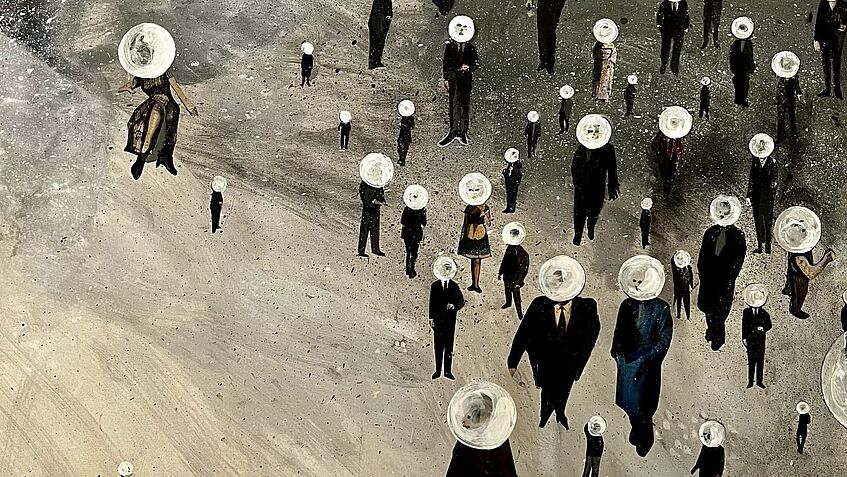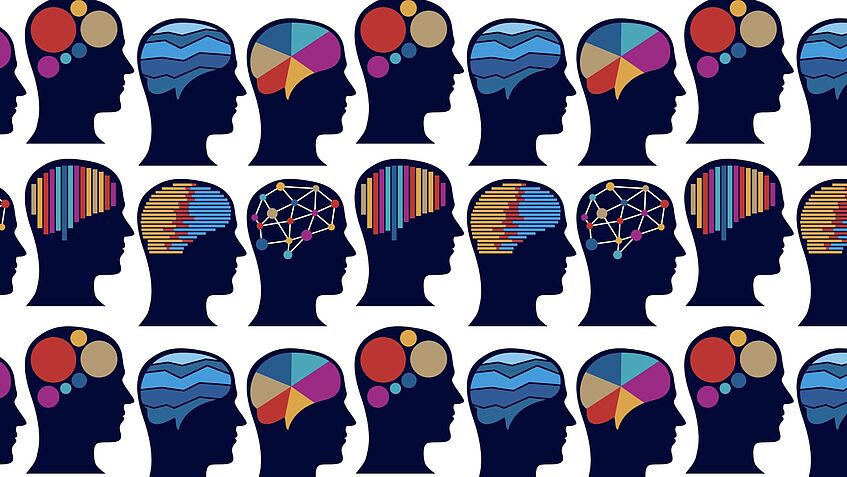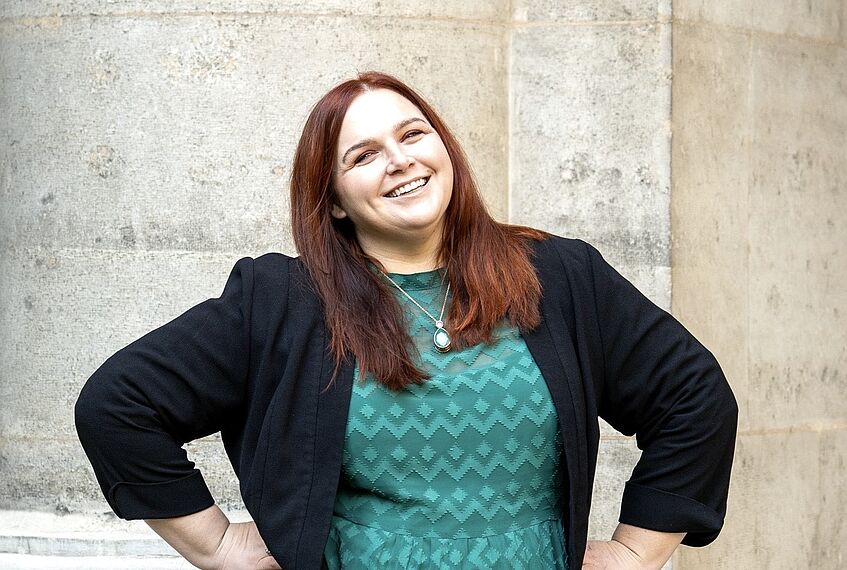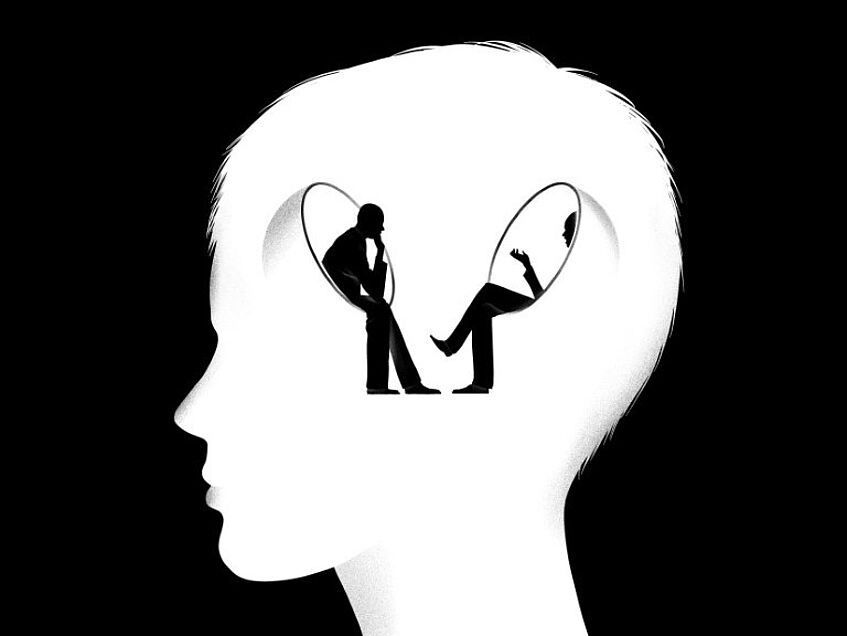Future Thinking
Public Interdisciplinary Lecture Series
While human cognitive processes are highly successful from an evolutionary perspective, their development has not sufficiently prepared us for the global challenges that our society currently faces from climate change to political polarization and the multifaceted impacts of artificial intelligence. In the lecture series "Future Thinking," researchers from various faculties at the University of Vienna present pressing societal issues and discuss how individual and collective cognitive processes must develop at all levels to tackle the significant societal challenges of our time.
The Public Interdisciplinary Lecture Series "Future Thinking" kicks off on 8 October at 18:30 in Hörsaal 1 (Universitätsring 1). The kick off will be followed by seven lectures taking place every second Tuesday during the 2024/25 winter term.
Information for Attendees
"Future Thinking" is a Public Interdisciplinary Lectures Series open to students and the general public. Lectures can be attended independently of each other. Registration is not required.
Past Events
Future Thinking: An Introduction

© Helmut Leder (1999-2003) Untitled (detail)
Future Thinking: An Introduction
8 October, 18:30, Hörsaal 1
Schedule:
- Introductory words by Helmut Leder
- Introduction to Future Thinking by Moritz Grosse-Wentrup
- Discussion about Future Thinking with Elisabeth Oberzaucher
Univ.-Prof. Dr. Helmut Leder is Professor of Empirical Aesthetics and Speaker of the Vienna CogSciHub.
Univ.-Prof. Dr. -Ing. Moritz Grosse-Wentrup is Professor of Neuroinformatics and Member of the Vienna CogSciHub Management Board.
Dr. Elisabeth Oberzaucher is a biologist and evolutionary psychologist, scientific director of Urban Human, and member of the Science Busters. Her research focuses on human behavior and cognition.
Predictive Thinking: How Your Brain Predicts the Future

Predictive Thinking: How Your Brain Predicts the Future
22 October, 18:30, Hörsaal 1
Priv.-Doz. Dr. Ronald Sladky is a cognitive neuroscientist at the University of Vienna, where he teaches courses on cognitive science and predicitive processing. His research focusses on the amygdala as well as emotion processing and social cognition in the human brain.
Teaser: According to the brain, it is the most fascinating organ in the universe. Despite all we have learned, we’re still far from fully understanding how it works, how it shapes our reality, and fuels both joy and sorrow. Yet, a groundbreaking new theory is capturing the attention of researchers worldwide. In this talk, I will gently introduce you to the Predictive Processing theory and Karl Friston's Free Energy Principle - concepts that could transform the way we understand the brain and our everyday experiences. It turns out, thinking might not be what you think.
Recording
Artificial Thinking: How Does an Artificial Intelligence Think?

Artificial Thinking: How Does an Artificial Intelligence Think?
5 November, 18:30, Hörsaal 1
Univ.-Prof. Dr.-Ing. Moritz Grosse-Wentrup is Professor of Neuroinformatics. He is the Head of the Research Group "Neuroinformatics" (Faculty of Computer Science), Vice-Director of Studies "Computer Science Directorate of Doctoral Studies", and Deputy Head of the Research Group "Security and Privacy" (Faculty of Computer Sciences).
Teaser: The recent revolutions in the field of artificial intelligence raise important questions: How will these developments affect our culture, our thinking and our daily lives? In my talk “Artificial Thinking”, I will trace the history of AI and explain what crucial steps were required to move from basic image recognition systems to today's AIs that are able to understand and generate complex language. I will then show how artificial intelligence is currently being used in research to understand our own thinking, and in certain cases - for example in patients with cognitive impairments - even to support or supplement it. Finally, I will give an outlook on how AI could further influence our thinking in the future, what developments can be expected and how we as a society can respond to these challenges.
Recording
Chatbot Thinking: How Language Does (Not) Help Us Think
© Daniel Stolle, www.danielstolle.com
Chatbot Thinking: How Language Does (Not) Help Us Think
19 November, 18:30, Hörsaal 1
Univ.-Prof. Dr. Jutta L. Mueller is Professor of Psycholinguistics at the Department of Linguistics (Faculty of Philological and Cultural Studies). She is Vice-Director of Studies "Psychology, Cognition, Behaviour, and Neuroscience Directorate of Doctoral Studies" and heads the Psycholinguistics Lab Babelfisch.
Teaser: New language-based technologies are on the verge to deeply change the way how we converse with each other and potentially with ourselves. In my talk I will explain the varieties and significance of the conversations we silently have with ourselves and how these may influence our thoughts, actions and feelings. I will expand on potential benefits of inner speech for self-control and emotion regulation, for perception, problem solving and for generating new ideas. Yet, our internal chatbot does not come without risks and can also cause emotional trouble and lead us astray. I will argue that inner speech is comparable to overt social speech in many respects and that we can foster both our emotional well-being and our cognitive capacities if we take good care of both.
Recording
Neurodivergent Thinking: Addressing Myths and Misconceptions about Autism

Neurodivergent Thinking: Addressing Myths and Misconceptions about Autism
3 December, 18:30, Hörsaal 1
Assoz. Prof. Dr. Giorgia Silani is Deputy Head of the Department of Clinical and Health Psychology (Faculty of Psychology) and heads the Clinical Social Neuroscience Unit.
Alice Laciny, PhD works at the Institute of Science and Technology Austria (ISTA). Her work focuses on the influence of parasites on the morphology of ant hosts.
Young Ah Kim, BSc MSc is a PhD candidate at the Department of Cognition, Emotion and Methods in Psychology (Faculty of Psychology).
Teaser: This talk will explore how scientific research can dismantle common stereotypes about autism, fostering a more accurate and inclusive understanding of the condition. By highlighting key findings in neuroscience and psychology, we will challenge outdated notions that paint autism as a homogeneous disorder defined solely by deficits. Instead, we will emphasize the diversity within the autism spectrum, focusing on strengths, individual variability, and the importance of neurodiversity. The talk aims to encourage the application of scientific insights to promote acceptance, reduce stigma, and improve support for autistic individuals in society.
Recording
Political Thinking: What Role Do Emotions Play in Politics?

© Jakob-Moritz Eberl
Political Thinking: What Role Do Emotions Play in Politics?
17 December, 18:30, Hörsaal 1
Univ.-Prof. Dr. Sophie Lecheler is Professor of Communication Science with a focus on Political Communication at the Department of Communication.
Teaser: Politics is deeply tied to human emotion. How we vote, protest, or discuss politics is shaped by our feelings about issues, candidates, or groups. Only recently have scholars begun to study emotion’s role in politics. Many argue that emotions fuel "bad" politics, like hate speech, radicalization, or extreme populism. But is this true? Meanwhile, the rise of digital technologies like generative AI, VR, and AR have sparked fears that the emotions their use causes are being further exploited for political gain. This lecture explores these questions and suggests a way forward for understanding emotion in politics.
Recording
Cultural Thinking: Why Are Movies Getting Dumber?

Thomas Cole, The Course of Empire: Destruction (1836)
Cultural Thinking: Why Are Movies Getting Dumber?
7 January, 18:30, Hörsaal 1
Dr. Mauricio Martins is a postdoctoral researcher at the Department of Cognition, Emotion, and Methods in Psychology (SCAN-Unit). His work focuses on the cognitive and cultural mechanisms underlying the representation of hierarchies, and the processes involved in the acquisition of those representations.
Teaser: Why are movies seemingly getting “dumber”? This presentation explores how psychological stress, socioeconomic factors, and cultural shifts influence movie complexity. Using data from 16,000 Hollywood films, it examines whether declining cognitive engagement and societal stress are behind the simplification of cultural artifacts. Surprising findings reveal that even elite-preferred movies aren’t immune to this trend. Dive into the research on how our ability to process complex narratives may be eroding—and the consequences this could have for society’s problem-solving capabilities!
Further reading:
- Song lyrics have become simpler and more repetitive over the last five decades (Scientific Reports) https://www.nature.com/articles/s41598-024-55742-x
- Cognitive fossils: using cultural artifacts to reconstruct psychological changes throughout history (Trends in Cognitive Sciences) https://www.sciencedirect.com/science/article/abs/pii/S1364661323002590
Urban Thinking: How Does Aesthetics in Urban Planning Influence Our Thinking?

© Matias del Campo. Courtesy of rhiz Vienna – contemporary underground.
Urban Thinking: How Does Aesthetics in Urban Planning Influence Our Thinking?
21 January 2025, 18:30, Hörsaal 1
Dr. Jan Mikuni is a postdoctoral researcher in the WWTF-funded project "Urban Intervention with Art in Public Space".
Teaser: In recent years, science has suggested that aesthetic experience could promote well-being. This lecture discusses how aesthetics and people's aesthetic experiences in urban environments could inform, shape, and help urban planning to make cities attractive and healthy places to live.

